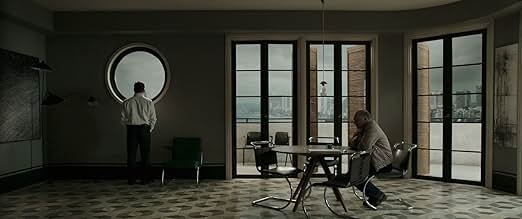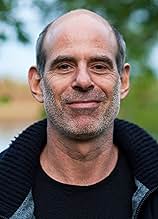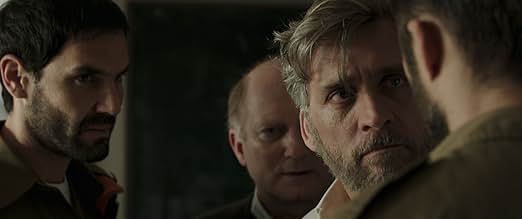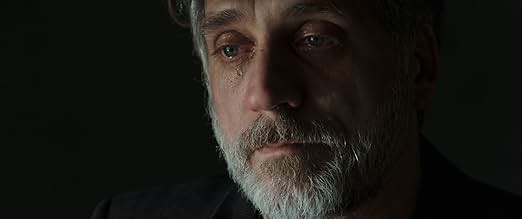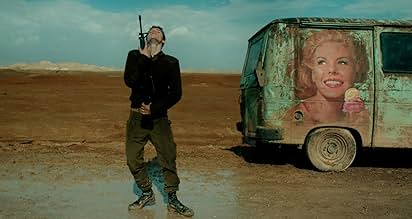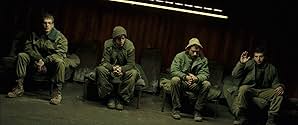NOTE IMDb
7,2/10
8,2 k
MA NOTE
Une famille perturbée doit regarder les choses en face lorsqu'un énorme problème survient au poste militaire désolé de leur fils.Une famille perturbée doit regarder les choses en face lorsqu'un énorme problème survient au poste militaire désolé de leur fils.Une famille perturbée doit regarder les choses en face lorsqu'un énorme problème survient au poste militaire désolé de leur fils.
- Récompenses
- 21 victoires et 25 nominations au total
Yonatan Shiray
- Jonathan
- (as Yonathan Shiray)
Itay Exlroad
- Dancer Soldier
- (as Etay Axelroad)
Arie Tcherner
- High Ranking Officer
- (as Aryeh Cherner)
Avis à la une
The methaphorical depiction of the futile repetition of war suggested by the 'Foxtrot' title deserved a better examination than this poorly acted, tedious & ultimately unconvincing movie. Even the several Foxtrot dance scenes themselves were stilted & out of place - ditto the videos of murmations of starling flocks clumsily inserted into the cinematography. In theory the plot contained a powerful narrative of the harrowing wartime experiences of the father being repeated by his conscript son but this was lost in the overly tedious & sometimes completely pointless plot - as in the scenes involving a soft-adult magazine also handed down from father to son - which just reduced the movie's important themes to comic book farce. Things improved significantly in the third act of the movie only to be deflated again by the weak final scene (..no spoilers..) It could have been so much better.
The theme 'war is absurd' has become a cliché that tests the creativity of many a filmmaker. How many ways can you represent the random chaos of shattered lives and senseless destruction? The emotional rollercoaster Foxtrot (2017) hits the high-watermark in originality for the way it deploys grief, social critique, and absurdism to show a different side of war.
The film's four acts defy the conventions of linear storytelling. In the opening seconds, a mother (Sara Adler) sees three soldiers at the door and before they can speak she collapses to the ground. With military precision, the doctor among them administers sedation and tells the father (Lior Askhkenazi) she will sleep for five hours; that's usual, they say. When a son has fallen in the line of duty they expect the father to cope. They leave; another comes to plan just another funeral; then alone, the father furiously paces like a caged beast, crushed by his own emotions. In five hours they return with totally different news.
That plotline alone could fill a movie, but it is merely the first step of an absurdist dance with chaos that goes forward, across, back, then returns to the beginning. In the second act we meet the very much alive son Jonathan (Yonaton Shiray) who is stationed on an isolated checkpoint where the only intruders are camels that have trained the guards to open the boom-gate to let them pass. Bored out of their minds, the four teenage warriors tell each other stories, punctuated by Jonathan's memorable foxtrot dance with his rifle as partner. The third and final acts complete this case study of random chaos; they include a scene one year later where the mother and father commiserate a tragedy and a dissolving marriage. The final seconds of the film match the opening in the way they erupt with the unexpected.
Undoubtedly, this film is anchored by the first 45 minutes in which Lior Askhkenazi gives a tour-de-force performance of going to hell and back. It is also a forensic satire that is beyond war clichés and that has infuriated the Israeli Military establishment. So much is being said in this film, with so few words spent. Small moments are jarring: like a father being told casually that his fallen son was promoted posthumously, as if he is worth more dead than alive, or the mechanically detailed way the military deals with death and bereavement. The camerawork and colour palette superbly set the mood of each act, and the asymmetry of the narrative reflects an alternative and absurdist universe in which war is normalised.
This is powerful cinema, the kind that can sweep you up with its characters, emotions, and story. Then, at the end of the film when the dance is done, you are left in disbelief at the banality of humanity. Watch for Foxtrotin Best Foreign Film award.
The film's four acts defy the conventions of linear storytelling. In the opening seconds, a mother (Sara Adler) sees three soldiers at the door and before they can speak she collapses to the ground. With military precision, the doctor among them administers sedation and tells the father (Lior Askhkenazi) she will sleep for five hours; that's usual, they say. When a son has fallen in the line of duty they expect the father to cope. They leave; another comes to plan just another funeral; then alone, the father furiously paces like a caged beast, crushed by his own emotions. In five hours they return with totally different news.
That plotline alone could fill a movie, but it is merely the first step of an absurdist dance with chaos that goes forward, across, back, then returns to the beginning. In the second act we meet the very much alive son Jonathan (Yonaton Shiray) who is stationed on an isolated checkpoint where the only intruders are camels that have trained the guards to open the boom-gate to let them pass. Bored out of their minds, the four teenage warriors tell each other stories, punctuated by Jonathan's memorable foxtrot dance with his rifle as partner. The third and final acts complete this case study of random chaos; they include a scene one year later where the mother and father commiserate a tragedy and a dissolving marriage. The final seconds of the film match the opening in the way they erupt with the unexpected.
Undoubtedly, this film is anchored by the first 45 minutes in which Lior Askhkenazi gives a tour-de-force performance of going to hell and back. It is also a forensic satire that is beyond war clichés and that has infuriated the Israeli Military establishment. So much is being said in this film, with so few words spent. Small moments are jarring: like a father being told casually that his fallen son was promoted posthumously, as if he is worth more dead than alive, or the mechanically detailed way the military deals with death and bereavement. The camerawork and colour palette superbly set the mood of each act, and the asymmetry of the narrative reflects an alternative and absurdist universe in which war is normalised.
This is powerful cinema, the kind that can sweep you up with its characters, emotions, and story. Then, at the end of the film when the dance is done, you are left in disbelief at the banality of humanity. Watch for Foxtrotin Best Foreign Film award.
'Foxtrot' begins with a woman, Dafna (Sarah Adler), opening her front door, seeing who is on the doorstep and immediately fainting. Moments later her husband Michael (Lior Ashkenazi, possibly Israel's busiest actor) is told by three members of the Israel Defence Forces (IDF) that his and Dafna's son Jonathan has been killed on military service. The IDF take over everything, arranging the funeral, dispensing sedatives to Dafna and setting alarms on Michael's telephone to remind him to drink every hour. Then the scene shifts and we are at Jonathan's lonely desert outpost, where the soldiers - when not sleeping and eating in a slowly-sinking shipping container - man a grubby checkpoint used most regularly by an unaccompanied camel. A final scene change brings us back to Dafna and Michael on what would have been Jonathan's twentieth birthday.
I found the middle and final segments the most interesting: although not a lot happens at the checkpoint, the segment set there is an interesting study on how boys from comfortable middle-class backgrounds cope when handed guns and forced to live in squalor. The bereaved parents' conversation in the third segment, in which we see how their loss has affected their relationship, is terribly bittersweet. By contrast, the first segment has a curiously episodic feel to it that may be intended to convey how Michael stumbles through the hours immediately after learning of his son's death, but I found rather jarring. On the whole, though, this slow-moving film is well worth watching.
I found the middle and final segments the most interesting: although not a lot happens at the checkpoint, the segment set there is an interesting study on how boys from comfortable middle-class backgrounds cope when handed guns and forced to live in squalor. The bereaved parents' conversation in the third segment, in which we see how their loss has affected their relationship, is terribly bittersweet. By contrast, the first segment has a curiously episodic feel to it that may be intended to convey how Michael stumbles through the hours immediately after learning of his son's death, but I found rather jarring. On the whole, though, this slow-moving film is well worth watching.
I am not sure why, but there's just something about this movie that brings warmth to my heart. I can't say that there's something inherently unique about its message, but the way that it communicated it really resonated with me. There is no evil in this film that causes pain to characters but rather just unfortunate events. And it's not someone's fault too. I think that this is a movie about the unnecessary suffering that we all have to live through. This message is often delivered with unnecessary pretentiousness and I was happy to feel none in this film.
There were a couple of lines that felt unnecessary, but it is because the whole movie is quite subtle and communicates a lot without words so these lines felt out of place.
The cinematography is also great, although it is not something I often draw attention to. Oh, and the acting is absolutely stellar, especially one of the father, I couldn't take my eyes off his performance.
I am upset that nobody I know saw this movie but I sure will recommend it to as many people as possible from now on so it gets credit it deserves.
There were a couple of lines that felt unnecessary, but it is because the whole movie is quite subtle and communicates a lot without words so these lines felt out of place.
The cinematography is also great, although it is not something I often draw attention to. Oh, and the acting is absolutely stellar, especially one of the father, I couldn't take my eyes off his performance.
I am upset that nobody I know saw this movie but I sure will recommend it to as many people as possible from now on so it gets credit it deserves.
As others have pointed out, this is a 3-act film. Act 1 provides a chilling view of the military precision of the Israeli military's process for informing a family of a tragedy. Act 2 provides a view of Foxtrot outpost, a checkpoint guarding some deserted road. There is the general boredom, combined with occasions of high anxiety, where any car to be checked could have suicide bombers. In Act 3, the family's unsuccessful attempt to see their son's body leads to more drama, with an ending that I consider too neat - hence my low score on the movie.
Le saviez-vous
- AnecdotesAccording to Samuel Maoz, the film was conceived as three episodes: The first sequence should shock and shake, the second should hypnotize, and the third should be moving.
- ConnexionsReferences Qui veut la peau de Roger Rabbit (1988)
- Bandes originalesNever Been
Performed by Betzefer
Meilleurs choix
Connectez-vous pour évaluer et suivre la liste de favoris afin de recevoir des recommandations personnalisées
- How long is Foxtrot?Alimenté par Alexa
Détails
Box-office
- Montant brut aux États-Unis et au Canada
- 618 883 $US
- Week-end de sortie aux États-Unis et au Canada
- 31 629 $US
- 4 mars 2018
- Montant brut mondial
- 1 356 159 $US
- Durée1 heure 53 minutes
- Couleur
- Mixage
- Rapport de forme
- 2.35 : 1
Contribuer à cette page
Suggérer une modification ou ajouter du contenu manquant




